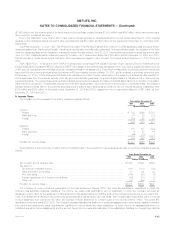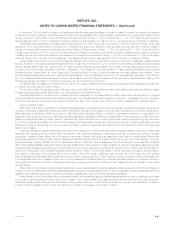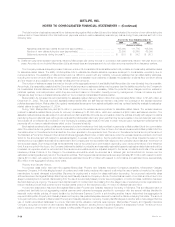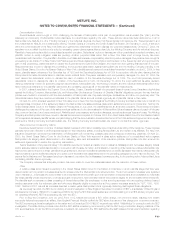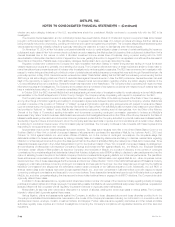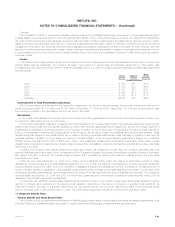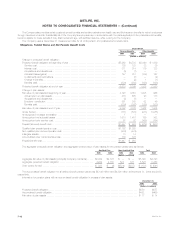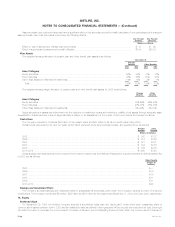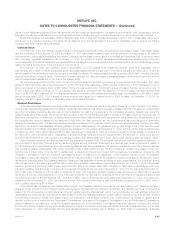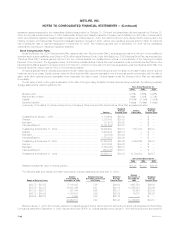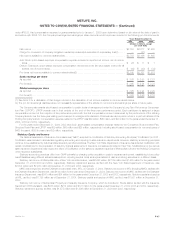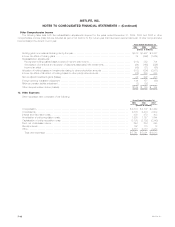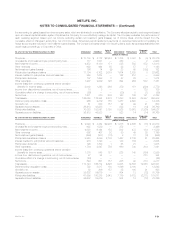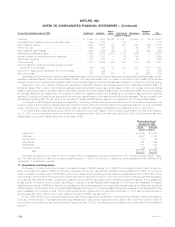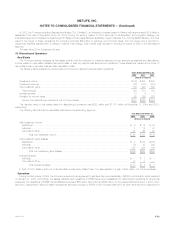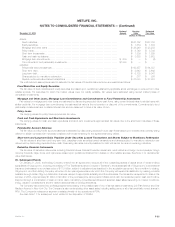MetLife 2004 Annual Report Download - page 88
Download and view the complete annual report
Please find page 88 of the 2004 MetLife annual report below. You can navigate through the pages in the report by either clicking on the pages listed below, or by using the keyword search tool below to find specific information within the annual report.METLIFE, INC.
NOTES TO CONSOLIDATED FINANCIAL STATEMENTS — (Continued)
Series A Junior Participating Preferred Stock will have economic and voting terms equivalent to one share of common stock. Until it is exercised, the right
itself will not entitle the holder thereof to any rights as a stockholder, including the right to receive dividends or to vote at stockholder meetings.
Stockholder rights are not exercisable until the distribution date, and will expire at the close of business on April 4, 2010, unless earlier redeemed or
exchanged by the Holding Company. The rights plan is designed to protect stockholders in the event of unsolicited offers to acquire the Holding
Company and other coercive takeover tactics.
Common Stock
On October 26, 2004, the Holding Company’s Board of Directors authorized a $1 billion common stock repurchase program. This program began
after the completion of the February 19, 2002 and March 28, 2001 repurchase programs, each of which authorized the repurchase of $1 billion of
common stock. Under these authorizations, the Holding Company may purchase common stock from the MetLife Policyholder Trust, in the open market
and in privately negotiated transactions. As of January 31, 2005, the Holding Company has suspended its share repurchases during 2005 and
repurchases after 2005 will be dependent upon several factors, including the Company’s capital position, its financial strength and credit ratings, general
market conditions and the price of the Company’s common stock.
On December 16, 2004, the Holding Company repurchased 7,281,553 shares of its outstanding common stock at an aggregate cost of
approximately $300 million under an accelerated share repurchase agreement with a major bank. The Holding Company will either pay or receive an
amount based on the actual amount paid by the bank to purchase the shares. The final purchase price will be settled in either cash or Holding Company
stock at the Holding Company’s option. The Holding Company recorded the initial repurchase of shares as treasury stock and will record any amount
paid or received as an adjustment to the cost of the treasury stock.
The Company acquired 26,373,952, 2,997,200 and 15,244,492 shares of the Holding Company’s common stock for $1,000 million, $97 million
and $471 million during the years ended December 31, 2004, 2003 and 2002, respectively. During the year ended 2004, 1,675,814 shares of common
stock were issued from treasury stock for $50 million. During the year ended 2003, 59,904,925 shares of treasury common stock with a cost of
$1,667 million were issued of which 59,771,221 shares were issued in connection with the settlement of common stock purchase contracts (see
Note 8) for $1,006 million cash and 133,704 shares were issued in connection with activities such as share-based compensation for $5 million in cash.
During the year ended 2002, 16,379 shares of common stock were issued from treasury stock for $438 thousand. At December 31, 2004, the
Company had $710 million remaining on its existing share repurchase authorization.
Dividend Restrictions
Under New York State Insurance Law, Metropolitan Life is permitted, without prior insurance regulatory clearance, to pay a dividend to the Holding
Company as long as the aggregate amount of all such dividends in any calendar year does not exceed the lesser of (i) 10% of its surplus to policyholders
as of the immediately preceding calendar year, and (ii) its statutory net gain from operations for the immediately preceding calendar year (excluding
realized capital gains). Metropolitan Life will be permitted to pay a dividend to the Holding Company in excess of the lesser of such two amounts only if it
files notice of its intention to declare such a dividend and the amount thereof with the New York Superintendent of Insurance ( the ‘‘Superintendent’’) and
the Superintendent does not disapprove the distribution. Under New York State Insurance Law, the Superintendent has broad discretion in determining
whether the financial condition of a stock life insurance company would support the payment of such dividends to its stockholders. The New York State
Department of Insurance has established informal guidelines for such determinations. The guidelines, among other things, focus on the insurer’s overall
financial condition and profitability under statutory accounting practices. For the years ended December 31, 2004, 2003 and 2002, Metropolitan Life paid
to MetLife, Inc. $797 million, $698 million and $535 million, respectively, in dividends for which prior insurance regulatory clearance was not required and
$0 million, $750 million and $369 million, respectively, in special dividends, as approved by the Superintendent. At December 31, 2004, the maximum
amount of the dividend which may be paid to the Holding Company from Metropolitan Life in 2005, without prior regulatory approval is $880 million.
Under Delaware Insurance Law, Metropolitan Tower Life Insurance Company (‘‘MTL’’) is permitted, without prior insurance regulatory clearance, to
pay a dividend to the Holding Company as long as the aggregate amount of all such dividends in any calendar year does not exceed the greater of
(i) 10% of its surplus to policyholders as of the next preceding calendar year, and (ii) its statutory net gain from operations for the next preceding calendar
year (excluding realized capital gains). MTL will be permitted to pay a cash dividend to the Holding Company in excess of the greater of such two
amounts only if it files notice of its intention to declare such a dividend and the amount thereof with the Delaware Commissioner of Insurance (the
‘‘Delaware Commissioner’’) and the Delaware Commissioner does not disapprove the distribution. Under Delaware Insurance Law, the Delaware
Commissioner has broad discretion in determining whether the financial condition of a stock life insurance company would support the payment of such
dividends to its stockholders. The Delaware Insurance Department has established informal guidelines for such determinations. The guidelines, among
other things, focus on the insurer’s overall financial condition and profitability under statutory accounting practices. On October 8, 2004, Metropolitan
Insurance and Annuity Company (‘‘MIAC’’) was merged into MTL. Prior to the merger, MIAC paid to MetLife, Inc. $65 million in dividends for which prior
insurance regulatory clearance was not required and no special dividends for the year ended December 31, 2004. For the year ended December 31,
2003, MIAC paid to MetLife, Inc, $104 million in dividends for which prior insurance regulatory clearance was not required and $94 million in special
dividends. For the year ended December 31, 2002, MIAC paid to MetLife, Inc. $25 million in dividends for which prior insurance regulatory clearance was
not required and paid no special dividends. MTL, exclusive of MIAC, paid no dividends during the years ended December 31, 2004, 2003 and 2002,
respectively. As of December 31, 2004, the maximum amount of the dividend which may be paid to the Holding Company from MTL in 2005, without
prior regulatory approval, is $119 million.
Under Rhode Island Insurance Law, Metropolitan Property and Casualty Insurance Company is permitted without prior insurance regulatory
clearance to pay a dividend to the Holding Company as long as the aggregate amount of all such dividends in any calendar year does not exceed the
lesser of (i) 10% of its surplus to policyholders as of the immediately preceding calendar year, and (ii) the next preceding two year earnings reduced by
capital gains and dividends paid to stockholders. Metropolitan Property and Casualty Insurance Company will be permitted to pay a stockholder dividend
to the Holding Company in excess of the lesser of such two amounts (an ‘‘extraordinary dividend’’) only if it files notice of its intention to declare such a
dividend and the amount thereof with the Rhode Island Commissioner of Insurance (‘‘Rhode Island Commissioner’’) and the Rhode Island Commissioner
does not disapprove the distribution. Under Rhode Island Insurance Law, the Rhode Island Commissioner has broad discretion in determining whether
the financial condition of stock property and casualty insurance company would support the payment of such dividends to its stockholders. For the year
ended December 31, 2004, Metropolitan Property and Casualty Insurance Company paid to MetLife, Inc. $300 million in extraordinary dividends.
MetLife, Inc. F-45


